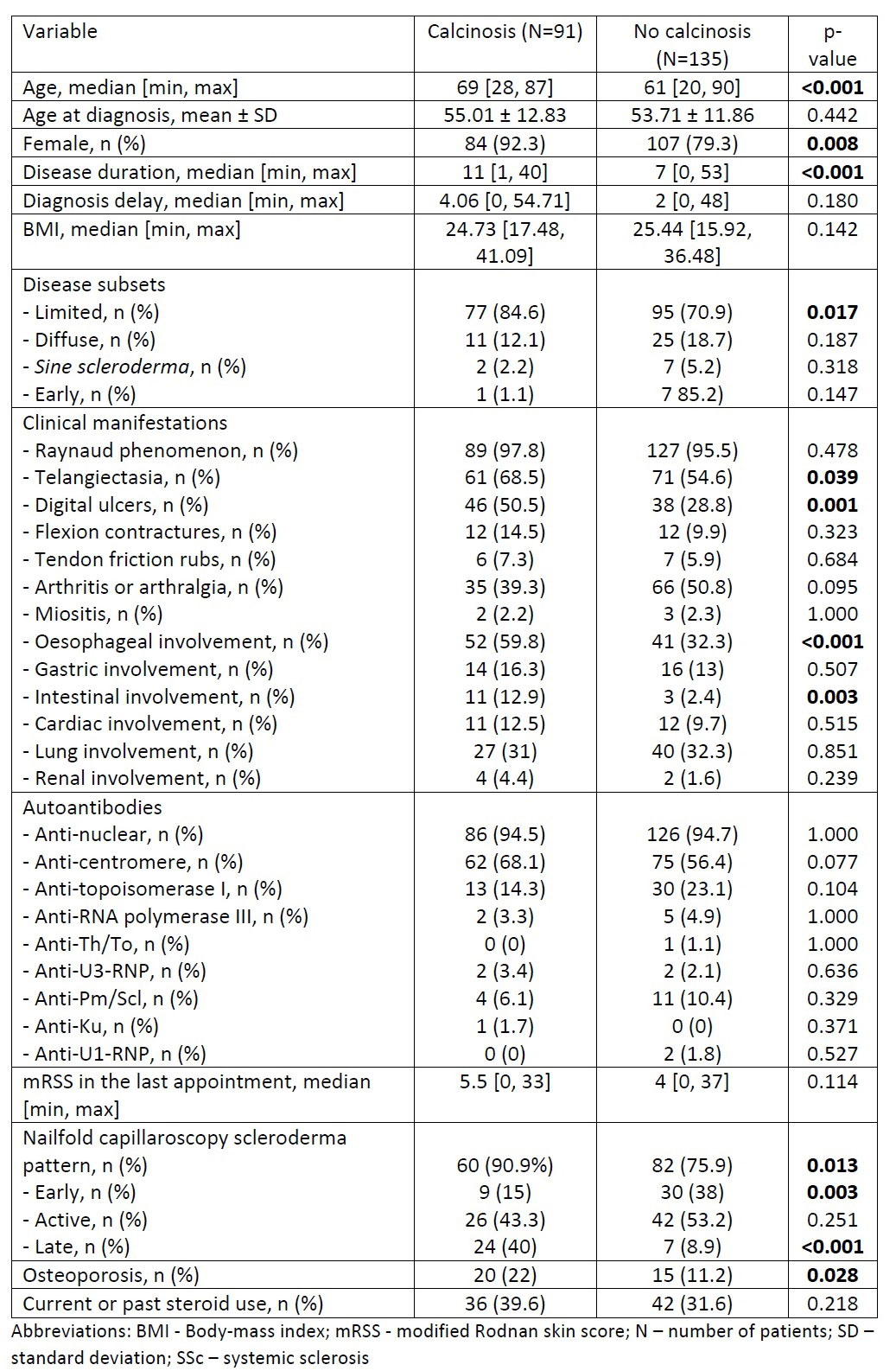Session Information
Session Type: Poster Session B
Session Time: 9:00AM-10:30AM
Background/Purpose: Calcinosis is a challenging problem among Systemic Sclerosis (SSc) patients with a reported prevalence of 18-49%. We aim to define the prevalence of clinical and subclinical calcinosis among Portuguese SSc patients, currently unknown, as well as the most sensitive anatomical location and the sensitivity of the clinical method for its diagnosis. We also aim to clarify the phenotype of SSc patients with calcinosis.
Methods: A cross-sectional multicenter study was conducted evaluating SSc patients from 14 Portuguese centers, registered in the Rheumatic Diseases Portuguese Registry (Reuma.pt), that fulfilled Leroy/Medsger 2001 or ACR/EULAR classification criteria for SSc. The assessment of calcinosis was made systematically through clinical examination and plain radiographs of hands, elbows, knees and feet, analyzed by 2 rheumatologists of each center. Statistical analysis with independent parametric or non-parametric tests, multivariate logistic regression of the significant variables in univariate analysis and sensitivity calculation of each radiographed site and of the clinical method for the diagnosis of calcinosis were performed.
Results: 226 patients were included, of whom 191 were female (84.5%), with a median [min, max] age of 64 [20, 90] years-old and a median [min, max] disease duration of 11.47 [1, 62] years. 172 patients (76.4%) had limited SSc, 36 (16%) diffuse SSc, 9 (4%) sine scleroderma SSc and 8 (3.6%) early SSc. Clinical calcinosis was described in 63 (28.1%) patients, 10 of which was not radiologically confirmed. 91 (40.3%) patients had radiological calcinosis in at least one site [hand in 68 (74.7%), knee in 32 (35.2%), elbow in 30 (34.1%) and foot in 21 (23.9%)], of which 37 (40.7%) were subclinical. The most sensitive location to detect calcinosis was the hand (74.7%) while the sensitivity of the clinical method was 58.2%. Table 1 summarizes the clinical characteristics of patients with and without calcinosis. Patients with calcinosis were more often female (p=0.008), older (p < 0.001) and with longer disease duration (p < 0.001). The presence of calcinosis was significantly associated with limited SSc (p=0.017), telangiectasia (p=0.039), digital ulcers (p=0.001), oesophageal (p < 0.001) and intestinal (p=0.003) involvements. Osteoporosis and late scleroderma capillaroscopic pattern (p < 0.001) were significantly more often on calcinosis group (p=0.028). In multivariate analysis, digital ulcers (OR 2.631, 95%CI 1.022-6.775, p=0.045) were found to be predictors of overall calcinosis, oesophageal involvement (OR 3.521, 95%CI 1.282-9.668, p=0.015) and osteoporosis (OR 4.083, 95%CI 1.176-14.176, p=0.027) of hand calcinosis and late capillaroscopic pattern (OR 7.608, 95%CI 1.661-34.858, p=0.009) of knee calcinosis.
Conclusion: The prevalence of overall calcinosis was in the range of that previously reported. The higher prevalence of subclinical calcinosis suggests that calcinosis might be underdiagnosed and that radiographic screening in SSc patients might be relevant. The differences between patients with and without calcinosis are in agreement with the literature. Calcinosis predictors appear to vary according to location and suggest a multifactorial pathogenesis.
To cite this abstract in AMA style:
Samões B, Fonseca D, Beirão T, Costa F, Vieira R, Terroso G, Ferreira R, teixeira R, Saraiva A, Henriques M, Duarte A, Cordeiro A, Vilas-Boas P, Genrinho I, Bento da Silva A, Gago L, Resende C, Martins P, Madeira N, Paiva Dinis S, Couto M, Santos I, Araújo F, Mourão A, Guerra M, Oliveira M, Daniel A, Rodrigues M, Soares C, Parente H, Furtado C, Fontes T, Abelha-Aleixo J. Assessment of Calcinosis in Portuguese Patients with Systemic Sclerosis – a Multicenter Study [abstract]. Arthritis Rheumatol. 2022; 74 (suppl 9). https://acrabstracts.org/abstract/assessment-of-calcinosis-in-portuguese-patients-with-systemic-sclerosis-a-multicenter-study/. Accessed .« Back to ACR Convergence 2022
ACR Meeting Abstracts - https://acrabstracts.org/abstract/assessment-of-calcinosis-in-portuguese-patients-with-systemic-sclerosis-a-multicenter-study/

